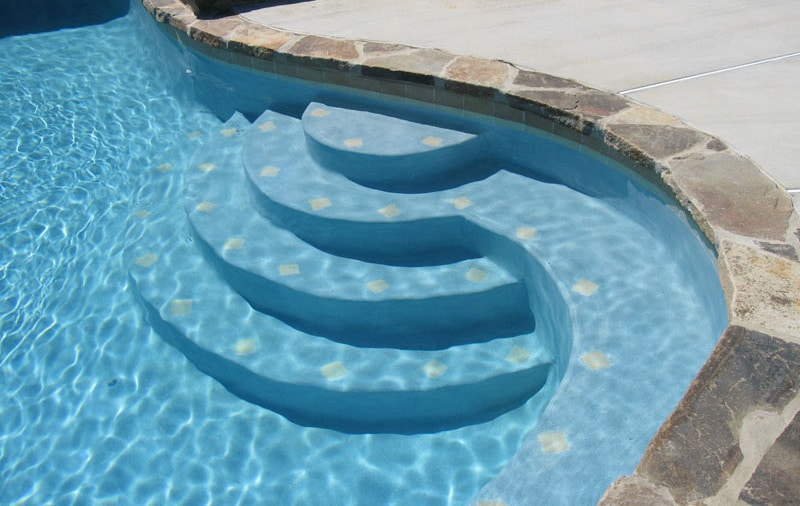Pool Maintenance Tips
Properly maintaining your swimming pool is important for several reasons. First, regular cleaning and chemical treatment can prevent the growth of harmful bacteria and algae, ensuring that the water is safe for swimming.
Second, regular maintenance can prolong the life of the pool and its equipment, saving money in the long run. A well-maintained pool can improve the overall appearance and enjoyment of the space. Below, we look at some maintenance tips to keep your swimming pool in excellent condition throughout the year.
Follow This Pool Maintenance Checklist
- Test the water regularly: It’s important to test the pH, chlorine, and alkalinity levels of your pool water on a regular basis to ensure that they are within the appropriate range.
- Skim the surface: Use a skimmer net or automatic skimmer to remove debris such as leaves, bugs, and other debris from the water’s surface.
- Brush the walls and floor: Use a pool brush to scrub the walls and floor of the pool to remove algae or other buildups.
- Vacuum the pool: Use a pool vacuum to remove dirt and debris from the bottom of the pool.
- Clean the filter: Clean or replace the filter cartridges or grids as needed to ensure that the pool’s filtration system works properly.
- Check the water level: Make sure the water level in the pool is at the appropriate level, usually halfway up the skimmer.
- Add chemicals: Add chlorine or other chemicals to keep the water clean and clear.
- Check the equipment: Check the pool’s pump, filter, and other equipment regularly to ensure it is in good working condition.
- Cover the pool: Use a pool cover to keep debris out of the pool when it’s not in use and reduce evaporation.
- Hire a professional: Consider hiring a professional pool service to help with maintenance, especially if you are not comfortable with pool maintenance or if you do not have the time to do it yourself. Pool maintenance companies provide complete services designed for any pool.
It’s important to keep in mind that different types of pools require different maintenance levels, and it’s important to follow the manufacturer’s instructions and recommendations. Additionally, to ensure safety, it’s important to keep an eye on the pool’s condition and address any issues as soon as they arise




Swimming Pool Maintenance Timeline
Knowing when to maintain a pool is as important as how to take care of it. Below is a suggested pool maintenance timeline.
Every 2 to 3 days
A pool owner should check water levels, test the pool chemicals, skim debris, and clean out baskets. If the water level is dangerously low there is a potential that you could damage your pump.
For those without an infloor cleaning system, you should also brush the steps.
To ensure the cleanest pool, you should try to get the dirt out of the pool before it reaches the bottom of the pool.
Every other week
You should try to brush the walls and tile to stop the algae growing and calcium buildup.
Every 2-3 months
The pool owner should clean the filter. This would also depend on the filter size, pool size, and pool usage.
If there is an increased flow between the flow meter and pressure gauge then that may be an indication that the filter needs to be cleaned.
Occasionally
Your pool will need to be shocked, which will simply return your pool to the normal chlorine level to remove all the unnecessary contaminants.
Depending on size and usage will determine how often this would be necessary.
What Types of Products Should I Use in My Pool?
Several chemicals are commonly used in swimming pools to maintain proper water balance and sanitation. These include:
- Chlorine: Chlorine is the most common chemical used to sanitize swimming pools. It kills bacteria, algae, and other microorganisms that can make the water unsafe to swim in. Chlorine can be added to the pool as tablets, granules, or liquid.
- pH balancer: The pH level of the water in a pool should be between 7.2 and 7.8. If the pH level is too low or too high, it can cause skin irritation, eye discomfort, and damage to the pool and equipment. You can use chemicals like sodium carbonate or sodium bisulfate to balance the pH level.
- Alkalinity: Alkalinity measures the water’s ability to resist changes in pH. It should be between 80 and 120 ppm. Alkalinity can be raised or lowered using chemicals like sodium bicarbonate or sodium bisulfate.
- Calcium hardness: Calcium hardness measures the amount of calcium in the water. It should be between 200 and 400 ppm. Calcium hardness can be increased or decreased using chemicals like calcium chloride or sodium hexametaphosphate.
It’s important to note that before adding any chemical to your pool, you should read and follow the manufacturer’s instructions and test the water regularly to ensure that it is within the proper range.

Schedule Pool Installation with Elite Pools
If you are ready to install a pool in your backyard, we are ready to help. Elite Pools is your preferred swimming pool contractor in the Mid-Atlantic region. Contact us today and let us install or renovate your residential or commercial pool.
Fill out our contact form or call us today for a free consultation or quote.
